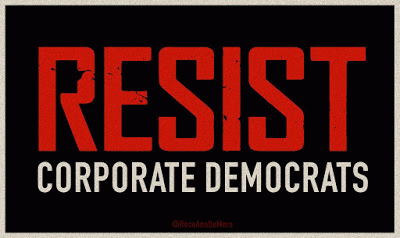This piece was reprinted by OpEd News with permission or license. It may not be reproduced in any form without permission or license from the source.
From Down With Tyranny
Is it impertinent to say this? Not constructive enough? Or necessary to make the change the country needs? I've heard all three asserted lately.
I'd like to put three thoughts together for consideration as a set.1. Chuck Schumer recently told George Stephanopolis that "we [Democrats] are united on economic issues." See 33:36 in this video.
Not sure what you think, but that seems the most absurd statement of the month. It's precisely economic issues -- trade deals, service to corporate needs, bailouts of Wall Street instead of Main Street, forgiveness of crushing debts like student loans -- that divide Democrats most deeply.
And worse, I think Schumer knows that he's lying as he says that.
2. The polling memo that lead to the Democratic Party's "Better Deal" plan contains these two contradictory statements. First, from the middle of the piece:
[A] large majority of battleground state voters respond favorably to [this] statement of the premise and direction that define the Better Deal Economic Agenda...:Note the attack on the wealthy that voters agree with. Now, from the first paragraph, in which Democrats who commissioned the polling were told their "themes" were consistent with this message:
"Too many families in America today feel that the rules of the economy are rigged against them. Special interests have a stranglehold on Washington -- from the super-rich spending unlimited amounts of secret money to influence our elections, to the huge loopholes in our tax code that help corporations avoid paying taxes...."
"As Senate and House Democrats begin to roll out their new Better Deal Economic Agenda, a review of recent public opinion polling shows that the central themes and frames that are at the heart of this agenda match closely with the experiences, values, and priorities of American voters today."Do you think the Democratic Party, as currently captained by Chuck Schumer and Nancy Pelosi, embraces the themes "the rules of the economy are rigged" and "special interests [the very rich] have a stranglehold on Washington"?
3. Consider this interesting piece from a David Sirota podcast about when the U.S. government stopped prosecuting "white collar" (i.e., Wall Street) crime. From a partial transcript, this is the introduction:
"In 2008 Wall Street banks created a financial crisis that incinerated the economy. It was only a few years after the Justice Department had aggressively prosecuted Enron and Arthur Anderson, and so many folks expected similar prosecutions of financial executives, especially because Democratic presidential candidate Barack Obama promised to 'bring a new era of responsibility and accountability to Wall Street.' But as recounted in a new podcast with Pulitzer Prize-winning journalist Jesse Eisinger, it never happened.From near the end of the interview (emphasis mine):
"Eisinger has just released a new book called 'The Chickenshit Club: Why the Justice Department Fails to Prosecute Executives.' It tracks how a furious pressure campaign by corporate America fundamentally changed the culture of the Justice Department. Instead of going after executives who commit white collar crime, the agency now often offers settlements with corporations, forcing shareholders to pick up the tab for fines while leaving executives untouched.
"The result, says Eisinger, is a criminal justice system that no longer seriously deters corporate crime, but instead makes it just a mundane cost of doing business. Shareholders may pay some fines, but executives often get a nice get-out-of-jail-free card, avoiding prison or any kind of punishment."
"Sirota: So a successful prosecution of Arthur Anderson becomes the justification for, 'We shouldn't prosecute Arthur Andersons in the future because the prosecutors in theory were too strong, were too harsh, went after them too vigorously.' Meanwhile, your book tracks the concurrent rise of the so-called 'too big to jail' idea. How did that evolve?Note that last paragraph; it's important. Eisinger continues:
"Eisinger: What happens is, there's a 1909 Supreme Court ruling [that says] if there is an employee who in the course of his or her job commits a crime, the entire company can be prosecuted. That is the power that the government has. It's essentially neglected. They don't really prosecute companies for a very long time."
"In the 1990s, starting out, they're unsatisfied with this. They don't really want to prosecute companies all the time. They used to be focused on individuals, but they started shifting the focus on trying to root out the rotten cultures at companies. They hit on this haphazardly. Mary Jo White, as the U.S. Attorney in the Southern District, comes up with this settlement. Then, she sends her lieutenant and writes a memo that Eric Holder signs saying, 'Here are the principles for how we're going to prosecute a company.' One of the principles is, 'We'll take into account collateral consequences.... Eric Holder gets a lot of blame for this in retrospect, but he didn't really write it.'
"Then, [the] Arthur Anderson [investigation] happens, and they ignored these principles, quite rightly in my view, and prosecute the company. Larry Thompson updates them, and that becomes the locus for the lobbying, where they hit on one aspect of these principles to try to tear them all down. The aspect of the principles is that they attack the fact that the government can ask for companies to waive attorney-client privilege when they're doing investigations, so that the government can get access to all that's going on in their own internal investigation. If companies want to cooperate and they want to get leniency from the government, they have to waive attorney-client privilege.
"Companies scream bloody murder, and so does the white-collar bar. Over the course of the next decade, those powers are completely rolled back, which really strip the ability for prosecutors to get inside companies to investigate. That has a whole cascading series of effects.
"Sirota: Okay. Now let's move up to the Obama era. What could the Obama administration have done based on all of the trends you've just charted, and what did it do instead?
(Note: You can view every article as one long page if you sign up as an Advocate Member, or higher).






